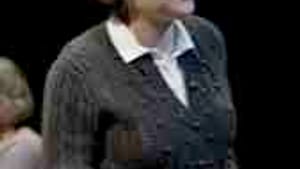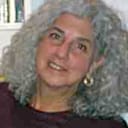Stay in the Loop
BSR publishes on a weekly schedule, with an email newsletter every Wednesday and Thursday morning. There’s no paywall, and subscribing is always free.
Family saga, global calamity
"When the Rain Stops Falling' in New York

Andrew Bovell, an Australian playwright, and David Cromer, the award-winning director (whose Off-Broadway Our Town bears a family resemblance to this new show), combine with a luminous cast in When the Rain Stops Falling to provide a searing and extraordinary theatrical experience.
The time span is 1959 to 2039, although the plot is anything but linear. The place is London and a variety of Australian locales—Adelaide, Alice Springs, Ayres Rock and the desolate Coorong, "a dangerous place" on the southern coast. The program comes with a genealogy chart. The characters are not only generational relatives but also older and younger versions of themselves. Sometimes they appear silently onstage together in a kind of literalizing realism of the individual personality.
It's raining. Not only cats and dogs, it's raining fish. When a big fish falls out of the sky, providing a man (Michael Siberry) with a lunch for his long-abandoned son (Henry Vick), now a grown man come to visit, he tells us that fish are thought to be extinct now, "now" being 2039: The rain is endless, apocalyptic, oppressive—created by a combination of Fitz Patton's brilliant sound design, Josh Schmidt's eerie music and David Korin's set. The latter is a silvery circle of a stage, overhung with storm clouds, that literalizes the figurative: Solid ground turns to water beneath your feet.
Old suitcases
The fish turns up repeatedly— fish soup becomes weirdly thematic as an endless attempt to make lunch for people who don't want it, don't like it, can't eat it. Same bowls, same spoons, generation after generation.
Similarly, other emblematic items are mentioned and ultimately produced: a boy's sneaker, a piece of driftwood, postcards, lost hats, wet umbrellas, all laden with meaning that finally only we know about. It's just the way stuff turns up in families, in drawers, in old suitcases: It's awful.
The family saga begins in London, when Henry (Richard Topol) and Beth (Kate Blumberg) have a son, Gabriel. As a grown man, Gabriel (Will Rogers) goes to Australia to try to find his father, who left the family years before— we know why, but he doesn't. On his quest, he meets and falls in love with Gabrielle (Susan Pourfar).
Telling time by generations
Meanwhile, Gabriel's mother, now older (Mary Beth Hurt), has remained a distant and silent woman, revealing nothing about the father her son needs to know about, and nearly nothing about herself. The reason for that silence is a promise made years before— a catastrophic event yields a catastrophic silence, yields catastrophic event. We meet Gabrielle again as a middle-aged woman (the superb Victoria Clark) when she is literally losing her mind; her husband Joe (Rod McLachlan) is a long-suffering, loving farmer.
These characters weave in and out of each other's lives as they weave on and offstage; generations, mostly unknown to each other, are a way of telling time. They're also a way of personalizing what seems to be cosmic doom, a worldwide environmental calamity.
Somebody screams, and someone says, "For a moment I thought it was the future screaming at me." A parent will cry out, waiting for a phone call that hasn't come in seven years, "They're cruel, aren't they, children?" And a grown child will exclaim, "They're cruel, aren't they, parents?"
Year without summer
Optimists and pessimists rebut each other's arguments, invoking the Enlightenment, "the triumph of the rational over irrational fears." One character is reading a book called The Decline and Fall of the American Empire, 1955-2015, and another remembers 1816, "the year without summer." And as various characters will remark, "How helpless we are when the weather turns against us." Weather becomes an immense concept— and it's hard to know whether hearing the rain stop falling is a relief or a terror.
This terrific play, embodied by this sensitive, thrilling, accomplished cast, tantalizes us with mysteries, with Diderot's dressing gown, with theories about capitalism, with love and guilt and the obscurity that is oneself.
The time span is 1959 to 2039, although the plot is anything but linear. The place is London and a variety of Australian locales—Adelaide, Alice Springs, Ayres Rock and the desolate Coorong, "a dangerous place" on the southern coast. The program comes with a genealogy chart. The characters are not only generational relatives but also older and younger versions of themselves. Sometimes they appear silently onstage together in a kind of literalizing realism of the individual personality.
It's raining. Not only cats and dogs, it's raining fish. When a big fish falls out of the sky, providing a man (Michael Siberry) with a lunch for his long-abandoned son (Henry Vick), now a grown man come to visit, he tells us that fish are thought to be extinct now, "now" being 2039: The rain is endless, apocalyptic, oppressive—created by a combination of Fitz Patton's brilliant sound design, Josh Schmidt's eerie music and David Korin's set. The latter is a silvery circle of a stage, overhung with storm clouds, that literalizes the figurative: Solid ground turns to water beneath your feet.
Old suitcases
The fish turns up repeatedly— fish soup becomes weirdly thematic as an endless attempt to make lunch for people who don't want it, don't like it, can't eat it. Same bowls, same spoons, generation after generation.
Similarly, other emblematic items are mentioned and ultimately produced: a boy's sneaker, a piece of driftwood, postcards, lost hats, wet umbrellas, all laden with meaning that finally only we know about. It's just the way stuff turns up in families, in drawers, in old suitcases: It's awful.
The family saga begins in London, when Henry (Richard Topol) and Beth (Kate Blumberg) have a son, Gabriel. As a grown man, Gabriel (Will Rogers) goes to Australia to try to find his father, who left the family years before— we know why, but he doesn't. On his quest, he meets and falls in love with Gabrielle (Susan Pourfar).
Telling time by generations
Meanwhile, Gabriel's mother, now older (Mary Beth Hurt), has remained a distant and silent woman, revealing nothing about the father her son needs to know about, and nearly nothing about herself. The reason for that silence is a promise made years before— a catastrophic event yields a catastrophic silence, yields catastrophic event. We meet Gabrielle again as a middle-aged woman (the superb Victoria Clark) when she is literally losing her mind; her husband Joe (Rod McLachlan) is a long-suffering, loving farmer.
These characters weave in and out of each other's lives as they weave on and offstage; generations, mostly unknown to each other, are a way of telling time. They're also a way of personalizing what seems to be cosmic doom, a worldwide environmental calamity.
Somebody screams, and someone says, "For a moment I thought it was the future screaming at me." A parent will cry out, waiting for a phone call that hasn't come in seven years, "They're cruel, aren't they, children?" And a grown child will exclaim, "They're cruel, aren't they, parents?"
Year without summer
Optimists and pessimists rebut each other's arguments, invoking the Enlightenment, "the triumph of the rational over irrational fears." One character is reading a book called The Decline and Fall of the American Empire, 1955-2015, and another remembers 1816, "the year without summer." And as various characters will remark, "How helpless we are when the weather turns against us." Weather becomes an immense concept— and it's hard to know whether hearing the rain stop falling is a relief or a terror.
This terrific play, embodied by this sensitive, thrilling, accomplished cast, tantalizes us with mysteries, with Diderot's dressing gown, with theories about capitalism, with love and guilt and the obscurity that is oneself.
What, When, Where
When the Rain Stops Falling. By Andrew Bovell; directed by David Cromer. Through April 18, 2010 at Mitzi Newhouse Theater at Lincoln Center, 150 West. 65th St., New York. (212) 239-6200 or www.lct.org/showMain.htm?id=191.
Sign up for our newsletter
All of the week's new articles, all in one place. Sign up for the free weekly BSR newsletters, and don't miss a conversation.

 Toby Zinman
Toby Zinman